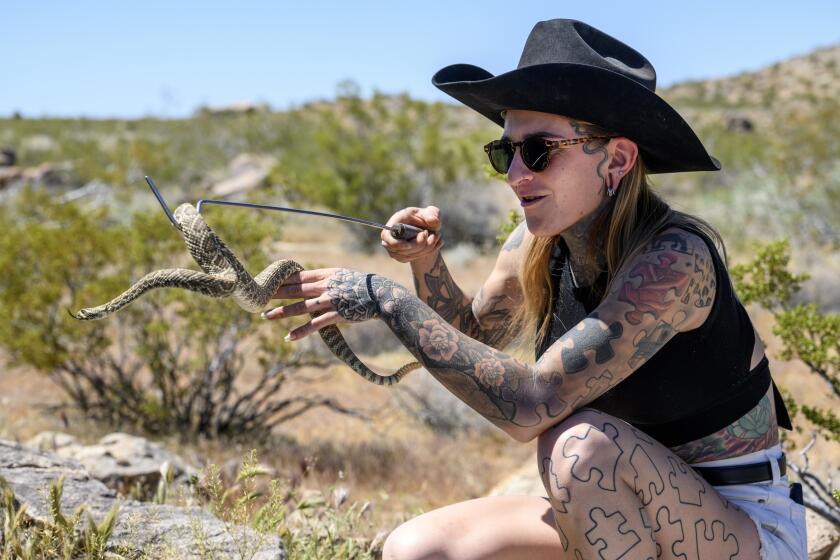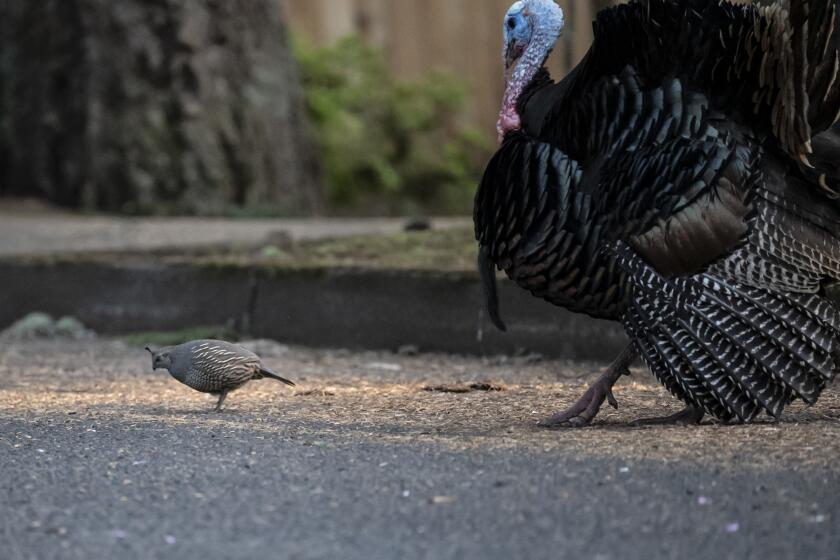It’s No Snap Finding a Home for This Cranky Crocodile
The authorities took it away, the humane society doesn’t know what to do with it and the zoo doesn’t want it.
What all that adds up to is a caiman without a home. And no doors appear to be opening for it anytime soon.
Although it’s mean, ugly, and according to the authorities, illegal, the 18-inch caiman was kept as a pet for two years. But earlier this month the animal’s owner had to part company with his reptilian pet when law enforcement officers, serving a search warrant at an Azusa home on an unrelated matter, spotted the croc and said it had to go.
Steven Morales, who said he was just lizard-sitting for a friend, gave the 2-year-old caiman to the San Gabriel Valley Humane Society after conferring with the animal’s owner, whom he declined to name.
Although the beast is not the first large lizard the society has had, it certainly has the worst disposition, said John Coleman, the society’s assistant director. “He’s got some pretty good teeth on him,” Coleman said. “He doesn’t like to be handled, that’s for sure.”
He said animal control officers have not determined this animal’s sex. “Nobody’s looked,” he said. “He won’t let us.”
Harvey Fischer, reptile curator at the Los Angeles Zoo, said the caiman is a member of the Crocodylidae family of reptiles, indigenous to Central and South America. It can grow as big as five feet and live up to 50 years.
At a foot and a half in length, this one is small enough to be intimidated by people but big enough to do damage, he said.
“Young ones can be a bit testy,” Fischer said. “Especially, if it’s a caiman.”
Under a year-old revision of the state Fish and Game Code, the keeping of a caiman or alligator is illegal, unless the owner has an exotic-animal permit. Illegal ownership is a misdemeanor, punishable by six months in jail and a $1,000 fine.
Although the pet’s owner did not have a permit, Morales said the caiman was bought before the law changed, and possibly was covered under a grandfather clause that exempts animals purchased before the revision. Morales said the owner might want his pet back.
Some might wonder why anyone would.
Morales, who said he is a reptile aficionado, doesn’t put caimans on his list of favorites.
“They’re really dirty,” he said. “They eat in the water, they go in the water--they do everything in the water. My whole place smelled when it was here.”
And the lizard does anything but endear itself to those it meets.
“He’s kind of nasty, you don’t want to pick him up and hold him,” said Coleman, who has yet to find a home for it. “We’re just going to hold him until we can find him a home at a zoo.”
But the Los Angeles Zoo doesn’t want it, said curator Fischer. Although the animal may be exotic next to a dog or cat, it is not considered a valuable display item for zoos because of its relative plentiful numbers in the United States, he said.
“We don’t want it,” he said, adding the zoo has one and that is enough. “It’s a definite white elephant in terms of people wanting it.”
More to Read
Start your day right
Sign up for Essential California for news, features and recommendations from the L.A. Times and beyond in your inbox six days a week.
You may occasionally receive promotional content from the Los Angeles Times.






